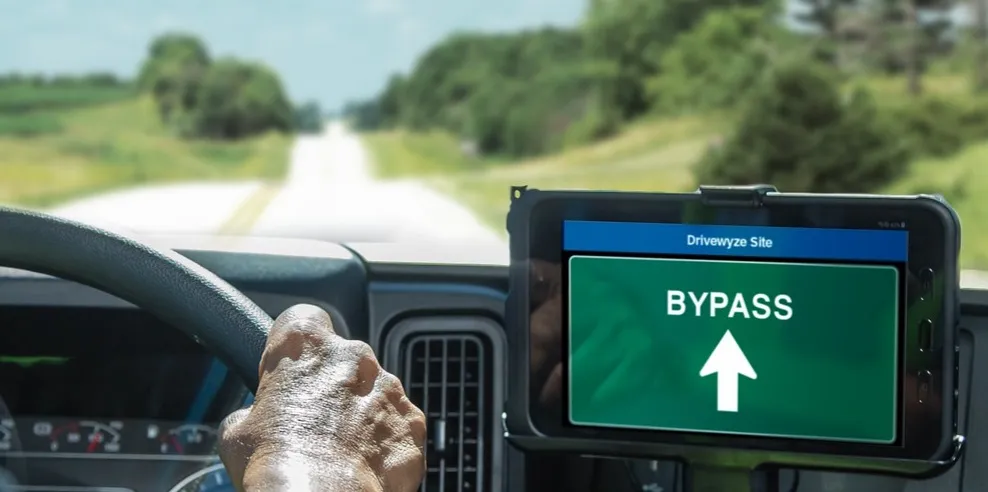
Momentum is growing for electronic inspections at weigh stations, according to Drivewyze, operator of the largest public-private weigh station bypass network in North America.
Drivewyze, a provider of connected truck services and based in Edmonton, Canada, says that the US states of Vermont, Kansas, Maryland, Maine, New Hampshire, Virginia and Utah are now piloting expedited in-station e-inspections at select weigh stations.
Drivewyze says that its programme is operating in a phase-one deployment that expedites CSA-crediting Level III inspections in station. The Compliance, Safety, Accountability (CSA) programme, run by the US Federal Motor Carrier Safety Administration (FMCSA), is designed to hold motorists, including owner-operators, accountable for their role in road safety. Level III inspections cover driver and hazardous materials issues.
Drivewyze said it will deliver more information on phase two of the programme that builds toward a vision of an in-motion Level VIII inspection in the coming months. Phase one is already delivering material benefits to participating agencies and fleets and is a solid step forward in Drivewyze’s goal to revolutionise roadside inspections, notes Brian Heath, chief executive of Drivewyze.
According to Heath, e-Inspection is dramatically reducing the time it takes to conduct traditional Level III inspections through automation, as it eliminates unnecessary manual data entry and duplication in traditional inspection processes.
"Traditionally, officers need to screen carrier and driver data against multiple back-office systems, each requiring a different login and manual data entry,” said Heath. "The process is time-consuming for officers as they juggle access and data entry into multiple federal and state systems. Credentials are often entered multiple times into unintegrated systems, which wastes time; and officers are only human, so it’s natural that errors occur in the process."
With e-Inspection, carrier and driver credentials, as well as HOS (hours of service) data, are transferred wirelessly from the Drivewyze platform, which is embedded in the vehicle’s onboard Electronic Logging Device (ELD). Officers don't need to collect this information manually, nor do they need to manually enter the information into multiple screening and inspection systems. "E-Inspection streamlines the officer’s workload by automatically entering, screening, and pre-populating inspection forms, allowing officers to focus on compliance,” he said "This dramatically reduces the time and errors that can happen with traditional roadside inspections.”
Drivers also have pain points with errors and inefficiencies in traditional inspections. "Drivers, who are often already nervous at being pulled over, can make mistakes with unpracticed HOS file transfers, waste time resolving manual data entry or process errors - or worse, receive unnecessary violations for non-compliance when transfer issues are not resolved.”
Any fleets subscribed to Drivewyze PreClear weigh station bypass service can request to participate in the e-Inspection pilot project. Drivewyze’s ELD partners are continuing with software updates so fleets can opt-in to this option. Currently, fleets using Platform Science and Geotab platforms can access and use e-inspection. Trimble support is currently in development.
Drivewyze’s trucking services include the Drivewyze PreClear bypass service, Drivewyze Safety+, Drivewyze Safety Notifications and data intelligence via Drivewyze Insights.









